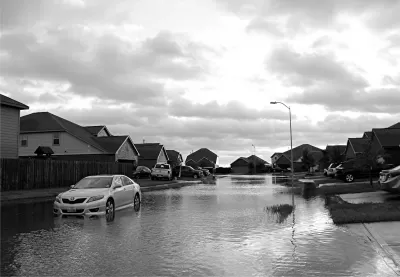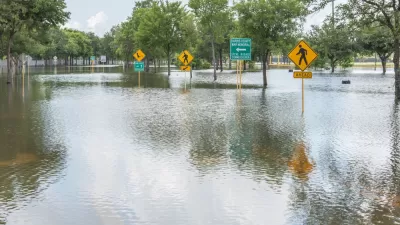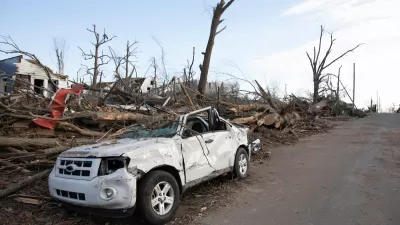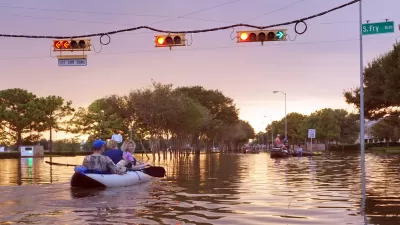The scale of the housing recovery effort means some jobs normally handles by FEMA have fallen to the Texas General Land Office.

In the aftermath of Hurricane Harvey, according to Brandon Formby of the Texas Tribune, "the Federal Emergency Management Agency worried that it didn’t have the capability to handle what was quickly becoming the largest housing recovery effort in American history."
"So [Texas Governor Greg] Abbott tasked the state’s General Land Office with a job that typically falls to FEMA: running short-term housing programs for Harvey victims. That undertaking includes everything from lining up contractors for minor repairs to securing trailers for displaced families."
Abbott has been criticized for waiting three weeks to employ the GLO for short-term housing, but "Abbott, Texas Land Commissioner George P. Bush and FEMA officials touted the unprecedented arrangement as a way to rewrite the nation’s disaster response playbook."
Since then, Formby writes, "initial public optimism has crashed against the reality of trying to re-engineer an already-byzantine process of getting disaster aid to hurricane survivors."
"The state-led plan was raising alarms from federal officials as well. The Department of Homeland Security’s Office of Inspector General said in a Sept. 29 'management alert' that because FEMA still hadn’t developed policies and procedures for the disaster recovery efforts, officials in hard-hit communities had been forced to develop housing plans themselves on a 'disaster-by-disaster basis.'"
In recent weeks, the federal government has promised a billion dollars for Harvey recovery by the first anniversary of the storm, with half of the money available right away.

Maui's Vacation Rental Debate Turns Ugly
Verbal attacks, misinformation campaigns and fistfights plague a high-stakes debate to convert thousands of vacation rentals into long-term housing.

Planetizen Federal Action Tracker
A weekly monitor of how Trump’s orders and actions are impacting planners and planning in America.

San Francisco Suspends Traffic Calming Amidst Record Deaths
Citing “a challenging fiscal landscape,” the city will cease the program on the heels of 42 traffic deaths, including 24 pedestrians.

Adaptive Reuse Will Create Housing in a Suburban Texas Strip Mall
A developer is reimagining a strip mall property as a mixed-use complex with housing and retail.

Study: Anti-Homelessness Laws Don’t Work
Research shows that punitive measures that criminalized unhoused people don’t help reduce homelessness.

In U.S., Urban Gondolas Face Uphill Battle
Cities in Latin America and Europe have embraced aerial transitways — AKA gondolas — as sustainable, convenient urban transport, especially in tricky geographies. American cities have yet to catch up.
Urban Design for Planners 1: Software Tools
This six-course series explores essential urban design concepts using open source software and equips planners with the tools they need to participate fully in the urban design process.
Planning for Universal Design
Learn the tools for implementing Universal Design in planning regulations.
Heyer Gruel & Associates PA
JM Goldson LLC
Custer County Colorado
City of Camden Redevelopment Agency
City of Astoria
Transportation Research & Education Center (TREC) at Portland State University
Jefferson Parish Government
Camden Redevelopment Agency
City of Claremont





























